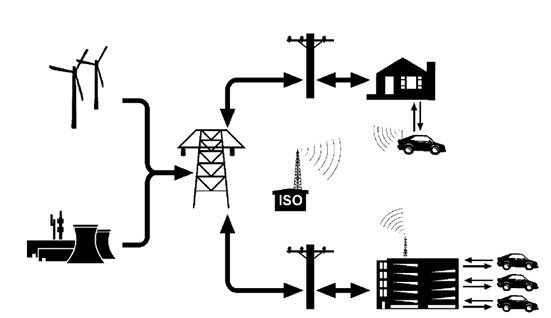Vehicle-to-Grid V2G
Published on Nov 23, 2015
Abstract
Electric drive vehicles can be thought of as mobile, self-contained, and-in the aggregate-highly reliable power resources. "Electric-drive vehicles" (EDVs) include three types: battery electric vehicles, the increasingly popular hybrids, and fuel-cell vehicles running on gasoline, natural gas, or hydrogen.
All these vehicles have within them power electronics which generate clean, 60 Hz AC power, at power levels from 10kW (for the Honda Insight) to 100kW (for GM's EV1). When vehicle power is fed into the electric grid, we refer to it as "Vehicle-to-Grid" power, or V2G.
With the popularization of electric vehicles and the construction of charging stations, the understanding of people to the electric vehicle and the changing station is not only confined to the transportation and the "gas station". It is desired to exploit more extensive application. The concept of V2G was firstly brought out by Willet Kempton of the Delaware University. The initial goal of V2G was to provide peak power, that is, the electric vehicle owners charging the vehicles in low load with lower price and discharging the vehicles in peak load with higher price. Then, the vehicle owners can get the profits from the V2G project.
The functions of the vehicle in power grid were expanded, and the conclusion was get that benefit of providing peak power is significantly less than providing auxiliary services to the power grid . The V2G research also was carried out in some other countries such as Denmark, Britain and Germany, etc .
Introduction of Vehicle-to-Grid V2G
The first V2G requirement is the power connection. Battery vehicles must already be connected to the grid inorder to recharge their batteries; to add V2G capability requires little or no modification to the charging station and no modification to the cables or connectors, but on board power electronics must be designed for this purpose had "zero incremental cost."
The second requirement for V2G is control, for the utility or system operator to request vehicle power exactly when needed. This is essential because vehicle power has value greater than the cost to produce it only if the buyer (the system operator) can determine the precise timing of dispatch. The automobile industry is moving towards making real-time communications a standard part of vehicles. This field, called "telematics" has already begun with luxury vehicles; over a period of time it will be available for most new car models. Whether using built-in vehicle telematics, or in the interim using add-on communications, the vehicle could receive a radio signal from the grid operator indicating when power is needed.
The third element of precision, certified, tamper-resistant metering, measures exactly how much power or ancillary services a vehicle did provide, and at which times. The telematics could again be used to transmit meter readings back to the buyer for credit to the vehicle owner's account
Thinking about the metering of V2G expands the usual concept of a "utility meter." Electronic metering and telemetric appear to have efficiency advantages in eliminating the meter reader, transfer of billing data to the central computer, and the monthly meter-read cycle. More unnerving, electronic metering and telemetric also eliminates the service address!
An onboard meter would transmit its own serial number or account number with its readings, via telemetric, and presumably this would be billed in conjunction with a traditional metered account with a service address.
A large-scale V2G system would automate accounting and reconciliation of potentially millions of small transactions, similar to the recording and billing of calls from millions of cellular phone customers.Thus the mobile metered KWhs or ancillary services wold be added or subtracted to the amount registered on the fixed meter to reconcile both billing amounts.
Concept Of V2G :

Figure schematically illustrates connections between vehicles and the electric power grid.
Electricity flows one-way from generators through the grid to electricity users. Electricity flows back to the grid from EDVs, or with battery EDVs, the flow is two ways (shown in Fig. as lines with two arrow ). The control signal from the grid operator (labelled ISO, for Independent System Operator) could be a broadcast radio signal, or through a cell phone network, direct Internet connection, or power line carrier. In any case, the grid operator sends requests for power to a large number of vehicles.
The signal may go directly to each individual vehicle, schematically in the upper right of Fig. , or to the office of a fleet operator, which in turn controls vehicles in a single parking lot, schematically shown in the lower right of Fig. , or through a third-party aggregator of dispersed individual vehicles' power (not shown). (The grid operator also dispatches power from traditional central-station generators using a voice telephone call or a T1 line, not shown in Fig .)